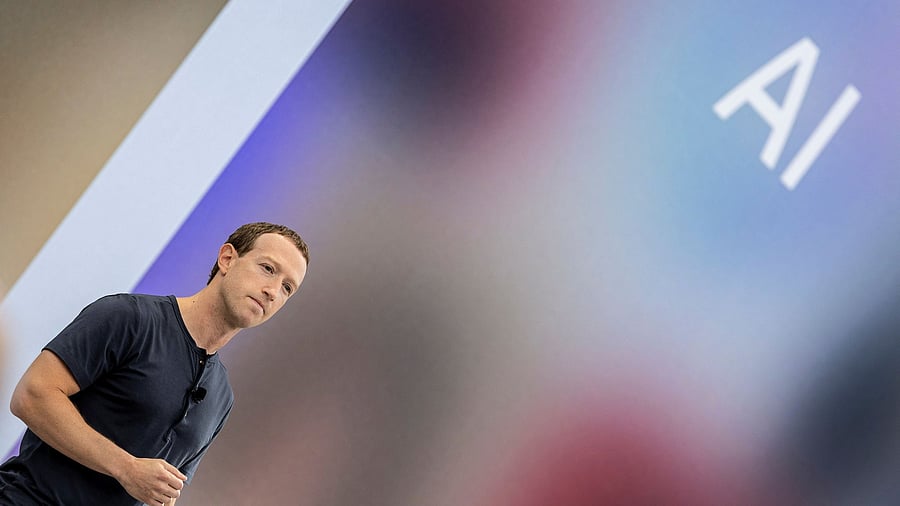
FILE PHOTO: Meta CEO Mark Zuckerberg delivers a speech, as the letters AI for artificial intelligence appear on screen, at the Meta Connect event at the company's headquarters in Menlo Park, California, US.
Credit: Reuters
While OpenAI and Google's DeepMind are racing against each other to lead the generative Artificial Intelligence (gen AI) space, Mark Zuckerberg's Meta Inc. is struggling to make any significant progress.
Peeved over the shortfalls in Meta AI, Zuckerberg is now personally getting involved in building a not-so-secret 'Superintelligence' AI team of globally acclaimed researchers and engineers with massive packages up to nine-figure salaries.
In recent weeks, Zuckerberg has been busy interviewing top AI experts for his dream AI team at his homes in Lake Tahoe and Palo Alto, reported Bloomberg.
Earlier this week, Meta reportedly acquired a 49 per cent stake in an AI startup, Scale AI for $14.8 billion. It is understood that Scale AI CEO Alexandr Wang will lead Zuckerberg's Superintelligence AI team.
It is worth noting that Wang's AI firm, in March 2025, signed a deal with the US Defence Ministry to modernise their weapons systems, military operations, and planning the use of their latest AI technology under the 'ThunderForge' initiative.
Despite the setbacks to his multi-billion dollar investment in Metaverse (augmented reality social media platform), Zuckerberg is bullish about Meta outrunning its peers to first achieve Artificial General Intelligence (AGI), the next frontier of gen AI.
Facebook's founder and CEO Mark Zuckerberg.
Credit: Reuters Photo
For the uninitiated, AGI is a hypothetical AI, which can think independently like a human being and do tasks with less or no supervision required. It can even learn from mistakes and do course corrections to get the job done.
Earlier this year in January when OpenAI celebrated two years of ChatGPT, co-founder Sam Altman said he is very optimistic about creating AGI in a few years.
"With superintelligence, we can do anything else. Superintelligent tools could massively accelerate scientific discovery and innovation well beyond what we are capable of doing on our own, and in turn, massively increase abundance and prosperity. This sounds like science fiction right now, and somewhat crazy to even talk about it. That’s alright—we’ve been there before and we’re OK with being there again. We’re pretty confident that in the next few years, everyone will see what we see, and that the need to act with great care, while still maximizing broad benefit and empowerment, is so important," said Altman.
However, even the most optimistic experts believe it is at least five to 10 years away for AGI to turn into a reality.
It requires all-new architecture to feed information and develop complex cognitive capabilities, and multiple layers of controls to ensure the AGI model acts ethically and doesn't get out of hand.
Though AGI can help fast-track progress in scientific studies in the health and agriculture sectors, there is a serious concern about replacing humans, particularly in white-collar jobs such as software engineering.
Already agentic gen AI models are being deployed in several major companies including Google, Microsoft, IBM and more.
For the uninitiated, Agentic AI is a level or two above the current-gen AI models. They can autonomously plan and make decisions, particularly in improving the efficiency of the software code.
It can be noted that AI is generating close to 30 per cent of the new codes in Google.
It remains to be seen how soon Zuckerberg's Superintelligence AI team will achieve the AGI feat and what new revolution it may bring to the world.
Get the latest news on new launches, gadget reviews, apps, cybersecurity, and more on personal technology only on DH Tech
